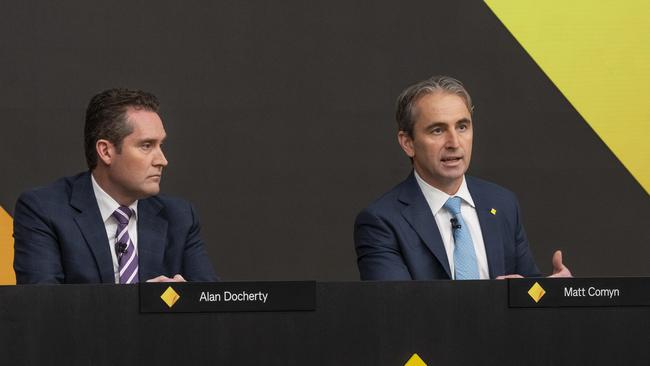Professional traders are shorting the nation’s biggest bank – but will they win?
Commonwealth Bank shareholders are being rattled by a new short attack on the nation’s No.1 bank – but why?

Business
Don't miss out on the headlines from Business. Followed categories will be added to My News.
Australia’s biggest bank stock is again under fire from short sellers. This time the professional traders are betting CBA shares have moved so high this year that gravity must soon pull the price back to Earth.
Meanwhile, more than 800,000 mum and dad investors will be hoping the shorts have it wrong.
Trading at close to $130 a share, CBA is up 30 per cent in 12 months, set against the ASX 200 lift of around 9 per cent.
Short activity – where traders bet the share price will go down and aim to make a profit using borrowed stock – is now higher at CBA than at any other of the big four banks.
Roughly $3bn is on the line for shorters, among them leading names such as Phil King of Regal Funds Management.
For many stocks, an increased volume of short bets is bad news. It’s worse when leading fund managers let it become public knowledge.
But CBA is far from an ordinary stock. It is a $213bn juggernaut where the sharpest criticism appears to be it is valued too highly.
Criticism of the bank revolves around a potential lift in costs, a potential loss of market share and a potential crimp of interest margins. However, despite 12 ‘sell’ notes appearing among 15 local stockbrokers, no stockbroking researcher has yet to land a knockout blow.
Meanwhile, the shorts continue to get it wrong. Not just this week or last week but all through 2024 so far. And every day this happens, retail investors become richer.
The current acceleration in CBA’s price, it has gained 9 per cent in a month, is partly due to a short squeeze – that means the last load of short bets were expensively incorrect and the professionals had to recover their positions – ironically pushing CBA higher as they bought up new stock.
Recurring sell calls and short action against the big four banks – ANZ, CBA, Westpac and NAB – has been a losing trade.
You would have to go back to the definitive Australian bank short – the Jim Chanos bet against Macquarie in 2007 to find an apparent money spinner. The US fund manager’s very public short call preceded an extended fall in Macquarie shares from around $86 to $17 in the following months. (Macquarie is worth $200 a share today).
CBA is not bulletproof – and the stock could fall any day – though it would be a long way down (around 25 per cent) to the current broker consensus share price target of $93.
In contrast, Westpac, currently seen as the weakest of the big bank stocks, would only need to drop 6 per cent to reach its target.
Moreover, CBA is now within a whisker of taking out the top spot as the market’s most valuable company from BHP, which continues to be sold off – there is only about $2bn in market cap between the two stocks.
Peter Gardner, a portfolio manager at Plato Investment Management has seen it all before. He suggests: “CBA might be a bit expensive but I don’t expect an big surprises from CBA – our position on the stock has not changed in any way with these various reports of short activity.”
CBA reports annual results on August 14.
Back in early May when CBA was closer to $115 I wrote here: “I would not be betting against a government-guaranteed financial cartel and for long-term investors, bank stocks offer a unique share investment.”
There is nothing on the horizon to change that point of view.
Originally published as Professional traders are shorting the nation’s biggest bank – but will they win?





